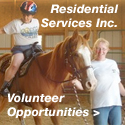Positive Behavior Support
Introduction to Positive Behavior Support (PBS):
For over 40 years, RSI has been successfully supporting individuals with emotional and behavioral challenges. Our success is in part due to an approach we use for addressing undesirable behaviors called Positive Behavior Support (PBS). The premise is the belief that the individuals we serve are just that; individuals. Building supports around their unique qualities, needs, and dreams in addition to focusing on the positive aspects of the person, is the start to reducing and eliminating challenging behaviors.
PBS Defined:
Positive Behavior Support is a lifestyle approach that enhances quality of life and minimizes undesirable behavior. This is accomplished by replacing negative behaviors with newly learned skills and proactively removing the trigger events from the person’s environment. PBS is an evolutionary approach emerging from applied behavior analysis, person-centered values, and the normalization/inclusion movement.
How RSI is Involved in PBS:
- RSI has participated in regional cohort training and technical assistance on Person-Centered and Positive Support Practices through the Institute on Community Integration (ICI). The intent of the training was to support organization-wide implementation and integration of person-centered practices and Positive Behavior Support while working toward systems changes.
- Several of RSI’s staff have completed ICI’s Positive Behavior Support Intensive training to become PBS facilitators.
- RSI participates on the leadership board of the Minnesota Positive Behavior Support Network to help monitor and oversee the progress made within the state of Minnesota on PBS.
- We are members of the Association for Positive Behavior Support, a network of over 1,400 researchers, professionals, and family members who promote evidence-based PBS.
Our goal is to support a person to have the life they want by providing a therapeutic environment that includes person-centered practices and positive behavior supports. We encourage active participation from the individual and their team in creating an individualized behavior plan. We also believe that a person-centered plan must be the beginning of the process and helps to inform the behavior support plan.



